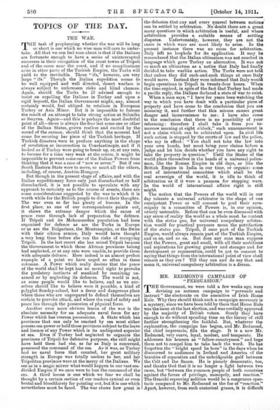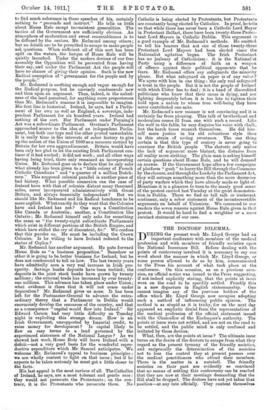MR. REDMOND'S CAMPAIGN OF "PERSUASION." T HE Government, we were told
a few weeks ago, were devising an autumn campaign to "persuade and instruct" the electorate on the amenities of Irish Home Rule. Why they should think such a campaign necessary is a mystery, since we have been told by them that Home Rule was the issue at the last election, and was cordially approved by the majority of British voters. Surely they have enough to do without spending time on the luxury of still further strengthening the faithful. But, whatever the explanation, the campaign has begun, and Mr. Redmond, the chief impresario, fills the stage. It is a new Mr. Redmond, very suave, loyal, modest, and temperate. He addresses his hearers as " fellow-countrymen " and begs them not to compel him to take back the word. He has forgotten the "bright speed he bore" in the days when he discoursed to audiences in Ireland and America of the beauties of separation and the unbridgeable gulf between the Celt and the Saxon. He is piously democratic, too, and thanks God that it is no longer a fight between two races, but "between the common people of both countries against the forces of privilege, monopoly, and reaction." The Gracchi reproving sedition would be a congruous spec- tacle compared to Mr. Redmond as the foe of "reaction." Apart, however, from such oratorical graces, it is difficult to fifid much substance in those speeches of his, certainly nothing to "persuade and instruct." He tells us little about Home Rule except inconsistent generalities. The tactics of the Government are sufficiently obvious. An atmosphere of moderation and sweet reasonableness is to be diffused by the orators, Mr. Redmond. among others ; but no details are to be permitted to escape to make people ask questions. When sufficient oil of this sort has been spilt on the waters, the barque of Home Rule will be quietly launched. -Under the modern devices of our free assembly the Opposition will be prevented from having their say, and under the Parliament Act the people will have no chance of giving their opinion. Such is the new Radical conception of "government for the people and by the people."
Mr. Redmond is soothing enough and vague enough for the Radical purpose, but he unwisely condescends now and then upon an argument. Then, indeed, is the naked- ness of the land perceived, for anything more preposterous than Mr. Redmond's reasons it is impossible to imagine. His first line is historical. Ireland, he says, had a Parlia- ment of her own as well as England, a sovereign, inde- pendent Parliament for six hundred years. Ireland had nothing of the sort. Her Parliament under Poyning's Act was a subordinate Parliament. Grattan's Parliament approached nearer to the idea of an independent Parlia- ment, but both one type and the other proved unworkable. It is really time in the interests of sober history to give up the notion of the -Union of 1800 as a measure carried by Britain for her own aggrandisement. Britain would have been only too glad to let the existing Irish Parliament con- tinue if it had worked ; it did not work ; and all other ways having being tried, there only remained an incorporating Union. Mr. Redmond. goes on to declare that he only asks what already has been given to a "little colony of French Catholic Canadians" and "a quarter of a million Dutch- men." This supposed colonial parallel is another piece of bad history. What possible connexion can the case of Ireland have with that of colonies distant many thousand miles, never incorporated administratively with Great Britain, and always financially independent? But we should like Mr. Redmond and his Radical henchmen to be more explicit. What exactly do they want that the Colonies have and Ireland has not ? One says a. Constitution like Canada or Australia; another, a Constitution like Ontario ; Mr. Redmond himself only asks for something the same as "the twenty-eight subordinate Parliaments which exist in different portions of the British Empire, and which have stifled the cry of discontent, &c." We confess that this puzzles us. He must be including the Crown Colonies. Is he willing to have Ireland reduced to the status of Ceylon ?
Mr. Redmond has another argument. He puts forward Home Rule as "a business proposition." Somehow or other it is going to be better business for Ireland, but he does not condescend to tell us how. The last twenty years have admittedly seen a very real increase in Irish pro- sperity. Savings banks deposits have been trebled; the deposits in the joint stock banks have grown by twenty millions the external trade has increased by over twenty- one millions. This advance has taken place under Union ; what evidence is there that it will not cease under Separation? Mr. Redmond gives us none. It has been left for the Postmaster-General to advance the extra- ordinary theory that a Parliament in Dublin would enormously develop the resources of the country, and that as a consequence "capital would flow into Ireland." Sir Edward Carson had very little difficulty on Tuesday night in exploding this strange dream. How is an Irish Government, unsupported by Imperial credit, to raise money for development ? Is capital likely to flow on easy terms to a land governed by the experienced statesmen of the National League? As we showed last week, Home Rule will leave Ireland with a deficit—not a very good basis for the wonderful repro- ductive expenditure which Mr. Samuel anticipates. We welcome Mr. Redmond's appeal to business principles ; we are wholly content to fight on that issue ; but if he expects to be taken seriously he must get a little closer to the facts.
His last appeal is the most curious of all. The Catholics of Ireland, he says, are a most tolerant and gentle race : they would not persecute the Protestants ; on the con- trary, it is the Protestants who persecute them. No Catholic is being elected by Protestants, but Protestants are constantly being elected by Catholics. In proof, he tells us that while there has never been a, Catholic Lord Mayor in Protestant Belfast, there have been twenty-three Protes- tant Lord. Mayors in Catholic Dublin. This argument is a good example of Mr. Redmond's methods. He omitted to tell his hearers that not one of those twenty-three Protestant Lord Mayors had been elected since the Nationalist agitation began. The Irish Protestant has no jealousy of Catholicism : it is the Nationalist Party using a difference of faith as a weapon of offence against their political opponents that he fears. Mr. Redmond offers any safeguards the minority please. But what safeguard. on paper is of any value ? We agree with him in one thing : the only real safeguard is trust in the people. But it is not the people of Ireland with which 'Ulster has to deal ; it is a, band of discredited politicians who know that their cause is dying, and are fighting desperately before it is too late to tighten their hold upon a nation to whose true well-being they have never contributed one mite.
Mr. Redmond's new manner is not convincing and it is certainly far from pleasing. This talk of brotherhood and moderation comes ill from one with such a record. Like the wolf in the fable, he may disguise his voice with chalk, but the harsh tones reassert themselves. He did him- self more justice in his old robustious style than in this strain of cooing sweetness. The one thing certain is that this type of oratory is never going to convince the British people. The rhetoric only makes the lack of argument more blatant, the distance from all reality more striking. The plain man is asking himself certain questions about Home Rule, and he will demand an answer. If the Government hope after a few campaigns of platform " gush " to hurry the Bill through the Commons by the closure, and through the Lords by the Parliament Act, they will outrage something more than the mere decencies of party warfare which they have already made so light of. Meantime it is a. pleasure to turn to the manly good sense of the protest carried last Tuesday at the great demonstra- tion in Dublin. There we find no tall talk or irrelevant sentiment, only a sober statement of the incontrovertible arguments on behalf of Unionism. We commend to our- readers the seven reasons against Home Rule given in that protest. It would be hard. to find. a weightier or a more succinct statement of our case.



















































 Previous page
Previous page